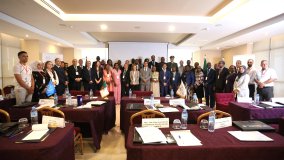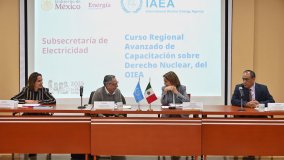The international legal framework for nuclear security is composed of legal instruments and recognized principles that are designed to prevent, detect and respond to criminal and other unauthorized acts involving or directed to nuclear or other radioactive material and associated facilities or activities.
Universal adherence to these instruments and harmonized national legal and regulatory frameworks can make a major contribution towards combating nuclear terrorism. The IAEA informs and advises States about the relevant international legal instruments and encourages them to adhere to and implement them.
The main international legal instruments adopted under the IAEA’s auspices are the Convention on the Physical Protection of Nuclear Material (CPPNM) and its 2005 Amendment, as well as the Code of Conduct for the Safety and Security of Radioactive Sources with its Supplementary Guidance.
The CPPNM entered into force on 8 February 1987. It establishes physical protection measures that have to be applied to nuclear material in international transport, as well as measures related to criminal offenses related to nuclear material. The Convention also envisages forms of international cooperation among the Parties.
On 8 July 2005, the Parties to the Convention adopted by consensus an Amendment to the CPPNM, which entered into force on 8 May 2016. The Convention and the Amendment are the only legally binding international instruments in the area of physical protection of nuclear material.
The Amendment constitutes an important milestone in international efforts to improve the physical protection of nuclear material and facilities. Whereas the obligations for physical protection under the CPPNM covered nuclear material during international transport, the Amendment to the CPPNM makes it legally binding for States Parties to protect nuclear facilities and material in peaceful domestic use, storage and transport. It also provides for expanded cooperation between and among States regarding rapid measures to locate and recover stolen or smuggled nuclear material, mitigate any radiological consequences of sabotage, and prevent and combat related offences.
Other international nuclear security instruments
There are several other international instruments that focus on nuclear security.
Among these, the International Convention for the Suppression of Acts of Nuclear Terrorism, in force since 7 July 2007, details offences relating to the unlawful and intentional possession and use of radioactive material or a radioactive device and the use or damage of nuclear facilities. It is designed to promote cooperation among countries through the sharing of information and the providing of assistance for investigations and extraditions.
Moreover, the United Nations Security Council adopted two resolutions that address, among other things, the threat of nuclear terrorism and nuclear proliferation. Resolutions1373 (2001) and 1540 (2004) also call for national, regional and international cooperation to strengthen the global response to these challenges and threats to international security.
The IAEA provides, on request, assistance to the UN Committees established in relation to these two resolutions. The Agency also assists Member States, where appropriate, in meeting their obligations under these resolutions.
Convention on the Physical Protection of Nuclear Material
Amendment to the Convention on the Physical Protection of Nuclear Material






